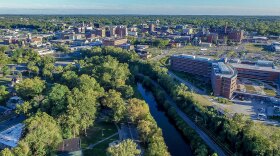In a bustling community center on the south side of Springfield, three people crowded behind a laptop to participate in the Ohio Haitians Speak Community Conversation.
In recent days, there have been far-right marches and bomb threats in Springfield. They come after the spread of false, racist claims online and by politicians that vilify Haitians in the city. Many Haitians say they feel unsafe, and on Saturday evening, they gathered to speak out during a virtual conversation.
The conversation was supposed to be in person and open to the public at the Haitian Community Health and Support Center in Springfield, but bomb threats forced organizers to lock the doors and move the event online.
Macollvie Neel, executive editor of the online newspaper The Haitian Times, moderated the conversation, which included academics, business owners, politicians and other journalists.
“How are we going to use this moment to organize, not just here in Springfield, but collectively across the country so we can help mitigate these types of situations," Neel said at the beginning of the webinar.
Jims Denis, a Haitian American who lives with his family in Springfield, has recently felt unsafe riding his bike or taking his kids to the park.
"You know, with the bomb threats and everything that is going on, Haitians are not safe in Springfield anymore," Denis said.
There are no official estimates, but community leaders in Springfield say that 15,000 to 20,000 Haitian people have moved to the city in the past five years. Some are transplants from places like Miami and Long Island, while others are Haiti refugees. The city's cheap housing and job opportunities have drawn them.
An attack on one is an attack on all Black and brown communities.Denise Williams
Vilès Dorsainvil, the executive director of Springfield's Haitian Community Health and Support Center, started the community conversation with a prayer. The center offers expanding services, such as home ownership seminars, health care services, and driving classes.
“Haitians are hard-working people. They will work more than 60 hours a week if possible." Dorsainvil said. "And because of that, they have been rapidly integrating into this community.”
Philomene Philostin, a Haitian American transplant from Florida who moved to the Miami Valley two years ago, owns a Haitian grocery store in Springfield.
"All those bad things I heard about the Haitians, all those things, it is really painful. It hurts. It stresses you out, especially for the young kids, the ones that are in school now," Philostin said.
Denise Williams, president of the Springfield Unit of the NAACP, said during the webinar that her organization is helping to bring mental health professionals to Springfield to support Haitian people dealing with anxiety and trauma from recent events.
“A lot of times, they can’t tell if we’re Haitians or not, so an attack on one is an attack on all Black and brown communities," She said. "I want you to know we are standing with you."
And the threats keep coming. Multiple hospitals in Springfield received bomb threats on Saturday morning. A far-right march was held on the city’s north side. Wittenberg University closed Sunday, Sept. 15, because of a threat.
Neel, the moderator, ended the event on Saturday night by urging Haitians in Springfield to stay vigilant.
“Keep your eyes open on each other and look out for your neighbor. Look out for your friends. Look out for the kids. Look out for your leaders,” she said.






